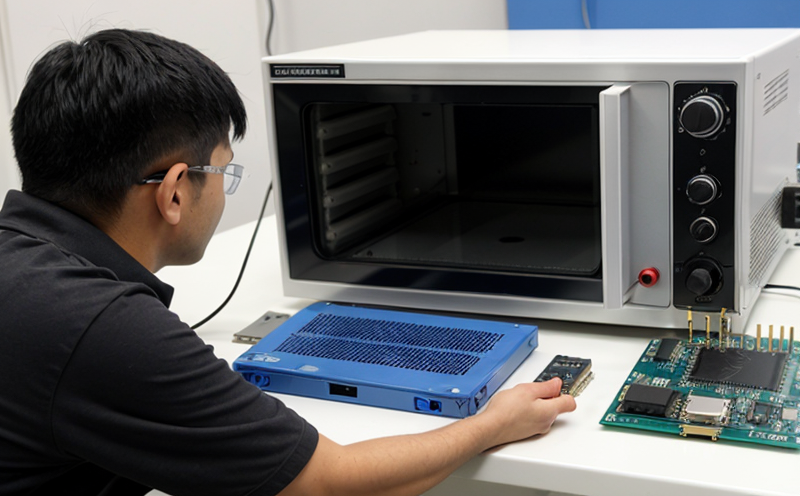JIS C 5101 Testing for Capacitors in Microelectronic Devices
The JIS C 5101 standard is a crucial specification in Japan that outlines the methods and requirements for testing capacitors used in microelectronic devices. This service ensures that capacitors meet stringent quality standards, which are essential for the reliability of electronic components across various sectors including automotive, consumer electronics, and telecommunications.
The testing process under JIS C 5101 involves multiple stages to evaluate different aspects of capacitor performance. These include electrical characteristics tests such as capacitance measurement, insulation resistance evaluation, and dielectric strength assessment. Additionally, environmental stress screening (ESS) is performed to simulate real-world conditions that capacitors might encounter during their lifecycle.
Electrical characteristics are critical for ensuring the proper function of electronic circuits. Capacitance measurement helps determine whether a capacitor meets its rated value accurately. Insulation resistance testing checks the integrity between conductive parts and the insulating material, preventing short circuits. Dielectric strength tests assess how well the capacitor withstands applied voltage without breakdown.
Environmental stress screening plays an important role by exposing capacitors to temperature cycling, vibration, and other environmental factors that mimic real-world usage scenarios. This ensures that capacitors can operate reliably under harsh conditions, thereby enhancing overall product quality.
The testing process typically begins with careful preparation of the samples according to specified guidelines in JIS C 5101. Proper sample handling is crucial to ensure accurate results and prevent any potential damage during testing.
After adequate preparation, various instruments are used depending on the specific tests required by the standard. These may include capacitance meters for measuring capacitance values, megohmmeters for insulation resistance checks, withstand voltage testers for dielectric strength evaluations, and automated environmental stress screening equipment capable of simulating different environmental stresses.
Once all necessary measurements have been taken and recorded, detailed reports are generated summarizing the findings from each test. These comprehensive reports provide valuable insights into the performance characteristics of capacitors tested under JIS C 5101 standards.
By adhering to rigorous testing procedures outlined in this standard, manufacturers can ensure that their capacitors meet strict quality requirements essential for reliable electronic devices. This not only enhances customer satisfaction but also strengthens market competitiveness by delivering high-quality products that comply with international standards.
Compliance with JIS C 5101 is especially important given the increasing complexity and miniaturization of modern microelectronic devices where even small deviations from specified performance parameters could lead to significant issues. Therefore, thorough testing ensures that capacitors perform optimally within their intended applications.
| Test Type | Description | Objective |
|---|---|---|
| Capacitance Measurement | Determines the actual capacitance value of a capacitor compared to its nominal rating. | Ensures that capacitors meet their specified capacitance values accurately. |
| Insulation Resistance Evaluation | Evaluates the resistance between conductive parts and insulating materials within a capacitor. | Prevents short circuits and ensures reliable operation of electronic devices containing these components. |
| Dielectric Strength Assessment | Tests how well a capacitor withstands applied voltage without breakdown. | Evaluates the durability and reliability under high-voltage conditions typical in many electronic applications. |
| Environmental Stress Screening (ESS) | Exposes capacitors to simulated real-world environmental stresses such as temperature cycling, humidity variations, etc. | Ensures that capacitors can operate reliably even under extreme conditions encountered during use. |
Incorporating JIS C 5101 testing into your product development and quality assurance processes will help you achieve these goals effectively. With our expertise in this area, we offer reliable services tailored to meet the specific needs of each customer.
Industry Applications
- Automotive electronics
- Consumer electronics like smartphones and tablets
- Telecommunications infrastructure components
- Medical devices requiring precise electrical performance
- Industrial automation systems relying on stable power supplies
The JIS C 5101 standard plays a vital role in ensuring the reliability of capacitors used across these diverse industries. By adhering to this stringent testing protocol, manufacturers can guarantee that their products meet international quality standards, thereby enhancing overall product performance and customer satisfaction.
Customer Impact and Satisfaction
By leveraging our expertise in JIS C 5101 testing for capacitors in microelectronic devices, customers experience significant benefits. Our rigorous testing processes ensure that only high-quality components are used in their products, leading to improved reliability and reduced failure rates.
This translates into lower maintenance costs, extended product lifespans, and enhanced reputation among end-users who appreciate consistent performance from well-tested electronics. Additionally, compliance with international standards like JIS C 5101 demonstrates a commitment to excellence that resonates positively with consumers seeking trustworthy brands.
Competitive Advantage and Market Impact
- Ensures superior product quality through adherence to stringent international standards.
- Promotes brand reputation by demonstrating commitment to excellence.
- Aids in achieving regulatory compliance, opening up new markets.
- Enhances customer satisfaction leading to repeat business opportunities.
The ability to offer products that comply with JIS C 5101 testing provides a strong competitive edge. It not only meets but often exceeds the expectations of customers seeking high-quality components for their electronic devices. By ensuring consistent performance and reliability, this service helps manufacturers maintain a positive reputation in both domestic and international markets.





